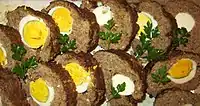High-protein diet
A high-protein diet is a diet in which 20% or more of the total daily calories comes from protein.[1] Most high protein diets are high in saturated fat and severely restrict intake of carbohydrates.[1]


Example foods in a high-protein diet include lean beef, chicken or poultry, pork, salmon and tuna, eggs, and soy.[2] High-protein diets have been criticized as a type of fad diet and for promoting misconceptions about carbohydrates, insulin resistance and ketosis.[1][3]
Health effects
A 2011 review concluded that a "long-term effect of high-protein diets is neither consistent nor conclusive."[4] A 2014 review noted that high-protein diets from animal sources should be handled with caution.[5] High-protein diets can increase levels of ketones in the blood (ketosis) which may lead to high levels of uric acid, a risk factor for gout and kidney stones.[6][7] High protein intake on the order of 200 g per day, coupled with inadequate intake of other calorie sources (fat or carbohydrates), can cause a form of metabolic disturbance and death commonly known as protein poisoning. Even when consuming other calorie sources, consuming more than 285 g of protein per day (for an 80 kg person) may be unsafe.[8]
A 2017 review indicated that a high-protein diet may contribute to life-long risk of kidney damage, including chronic kidney disease.[9] Although this was disputed in a different review, a year later.[10] High-protein diets may increase the risk of coronary artery disease, cancer and osteoporosis.[3][11][12] Vitamin B deficiencies can develop if the diet is followed chronically, and negative effects associated with the diet may include bad breath, constipation, fatigue, and nausea.[12][13] A 2020 review found that a high-protein diet does not significantly improve blood pressure and glycemic control in people with diabetes.[14]
Sports training
While elevated amounts of protein consumption are beneficial during athletic training, particularly when attempting to gain muscular mass and strength, there is little evidence of any benefit from increasing protein intake above 2 g/kg bodyweight/day.[15]
Criticism
In 2001, the American Heart Association’s Nutrition Committee issued a strong recommendation against high-protein diets such as Protein Power and the Atkins diet.[3] The committee noted potential health risks of high-protein diets and how there are no long-term scientific studies to support their efficacy and safety.[3][16]
The following high-protein diets have been criticized as fad diets:[1][3][17][18]
- Atkins diet
- Dukan Diet
- Montignac diet
- Protein Power
- Scarsdale diet
- Stillman diet
- Sugar Busters!
- Zone diet
See also
- List of foods by protein content
- Bodybuilding supplement
- Dietary supplement
- Human nutrition
- List of diets
- Low-protein diet
- Nutrition
References
- Longe, Jacqueline L. (2008). High-protein diet. In The Gale Encyclopedia of Diets: A Guide to Health and Nutrition. Gale. pp. 524-526. ISBN 978-1-4144-2991-5
- "High-Protein Diets: Do They Work?". WebMD. 8 October 2018. Retrieved 18 November 2018.
- St Jeor ST, Howard BV, Prewitt TE, Bovee V, Bazzarre T, Eckel RH (October 2001). "Dietary protein and weight reduction: a statement for healthcare professionals from the Nutrition Committee of the Council on Nutrition, Physical Activity, and Metabolism of the American Heart Association". Circulation. 104 (15): 1869–74. doi:10.1161/hc4001.096152. PMID 11591629.
- Lepe M, Bacardi Gascon M, Jimenez Cruz. (2011). A: Long-term efficacy of high-protein diets: a systematic review. Nutr Hosp 26: 1256-1259.
- Schwingshackl, L., & Hoffmann, G. (2014). Comparison of high vs normal/low protein diets on renal function in subjects without chronic kidney disease: a systematic review and meta-analysis. PLoS One 9(5): e97656.
- Avoid 'Fad' Diets. FDA Consumer. Volume 36, Issue 1. p. 24. 2002.
- Starr, Cecie; Taggart, Ralph; Evers, Christine; Starr, Lisa. (2011). Biology: The Unity and Diversity of Life. Cengage Learning. p. 732. ISBN 978-0-495-55792-0 "High-protein diets force the kidneys to work overtime to dispose of nitrogen-rich breakdown products. Such diets also increase the risk for kidney stones. These hardened deposits form when uric acid, calcium, and other wastes settle out of urine and collect in the renal pelvis."
- Bilsborough, Shane; Mann, Niel (April 2006). "A review of issues of dietary protein intake in humans". International Journal of Sport Nutrition and Exercise Metabolism. 16 (2): 129–52. doi:10.1123/ijsnem.16.2.129. PMID 16779921.
- Kalantar-Zadeh K, Fouque D (2 November 2017). "Nutritional management of chronic kidney disease". N. Engl. J. Med. 377 (18): 1765–1776. doi:10.1056/NEJMra1700312. PMID 29091561. S2CID 27499763.
- Michaela C Devries et al. (2018). Changes in Kidney Function Do Not Differ between Healthy Adults Consuming Higher- Compared with Lower- or Normal-Protein Diets: A Systematic Review and Meta-Analysis, The Journal of Nutrition. DOI: 10.1093/jn/nxy197
- Margolis, Simeon. (2005). High-Protein Diets. In The Johns Hopkins Medical Guide to Health After 50. Black Dog & Leventhal. p. 41. ISBN 978-1579124694
- Hoeger, Wener; Hoeger, Sharon. (2007). Fitness and Wellness. Thomson Learning, Inc. p. 130. ISBN 0-495-01256-4
- Bodinski, Lois H. (1987). The Nurse's Guide to Diet Therapy. Wiley. p. 77. ISBN 978-0471011965
- Yu, Zhangping; Nan, Fengwei; Wang, Leslie Yingzhijie; Jiang, Hua; Chen, Wei; Jiang, Yu (2020). "Effects of high-protein diet on glycemic control, insulin resistance and blood pressure in type 2 diabetes: A systematic review and meta-analysis of randomized controlled trials". Clinical Nutrition. 39 (6): P1724-1734. doi:10.1016/j.clnu.2019.08.008. PMID 31466731. S2CID 201674247.
{{cite journal}}: CS1 maint: multiple names: authors list (link) - Tipton, K. D.; Wolfe, R. R. (2004). "Protein and amino acids for athletes". Journal of Sports Sciences. 22 (1): 65–79. doi:10.1080/0264041031000140554. PMID 14971434. S2CID 16708689.
- "High-Protein Diets Not Proven Effective And May Pose Health Risks". Retrieved 18 December 2019.
- Alters S, Schiff W (22 February 2012). Chapter 10: Body Weight and Its Management. Essential Concepts for Healthy Living (Sixth ed.). Jones & Bartlett Publishers. p. 327. ISBN 978-1-4496-3062-1.
- Nouvenne A, Ticinesi A, Morelli I, Guida L, Borghi L, Meschi T (2014). "Fad diets and their effect on urinary stone formation". Transl Androl Urol (Review). 3 (3): 303–12. doi:10.3978/j.issn.2223-4683.2014.06.01. PMC 4708571. PMID 26816783.
Further reading
- Kamyar Kalantar-Zadeh, Holly M. Kramer, Denis Fouque. (2019). High-protein diet is bad for kidney health: unleashing the taboo. Nephrology Dialysis Transplantation gfz216.